Meet the couples behind fertility start-up WHEN bringing IVF testing kits into homes
A chance encounter between two couples, one struggling to have a baby and the other biotech founders, led to a ‘crazy’ idea that brought fertility testing into homes and potential joy to prospective parents.
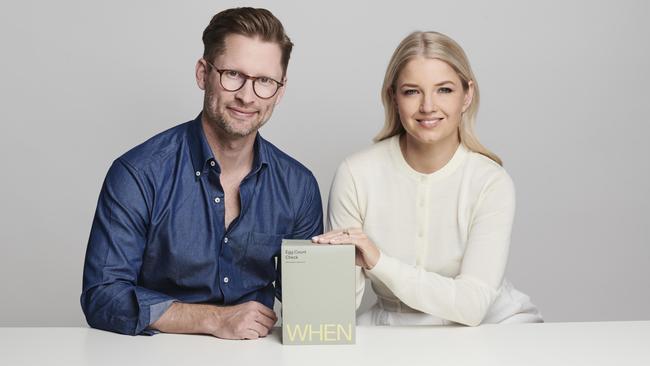
A chance meeting between two couples is one that will potentially change the lives of thousands of parents struggling to conceive a child.
Three years ago public relations queen Malyon “Maz” Coote wed Brett Barnes at the iconic Icebergs Dining Room and Bar, perched above the surf of Sydney’s Bondi Beach.
Then in December of that year they met Stephen and Angela Tomisich, the founders of listed analytical science and devices company Trajan Scientific and Medical, chaired by Australian rugby union legend John Eales. It was a life-altering encounter.
Coote and Barnes, who now have a two-year-old daughter named Charlotte, had experienced a debilitating struggle of fertility misinformation and it inspired them to seek a clinical grade, at-home fertility test kit.
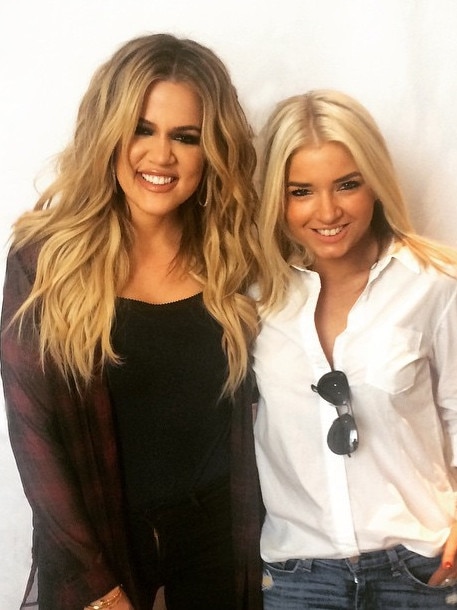
“We started off with a global search for devices. We wanted to find what was really an opportunity for us to innovate in the at-home collection experience,” Barnes says.
“By the end of the first month, I looked like a human pin cushion. We had imported stuff from all around the world and were just testing, testing, testing.”
One device stood out from the pack; it was produced by a Californian company called Neoteryx, which at the time had just been acquired by the Melbourne-based Trajan – the 11th acquisition in the latter firm’s then decade-long history.
Once Barnes and Coote connected on a video call with the Tomisiches, they struck what they call a “digital handshake” agreement – and never looked back.
Stephen Tomisich says: “Our experience thus far has been that people who are driven by personal experience are the ones that are motivated the strongest to persevere and succeed in what they are doing.
“If you are going to succeed in some of these challenging endeavours, you’ve got to have that underlying motivation and that drive that comes from an emotional connection.
“So I think that endeared us to the team of Brett and Maz, because you know that it is meaningful and that it is about making a difference in people’s lives.”
The partnership led to the launch of Barnes and Coote’s fertility med-tech company called WHEN Fertility, which has made clinical-grade fertility testing available in Australian homes.
Barnes recalls: “We found one of the very top fertility specialists in the world and one of the most published in Australia, Professor William Ledger. We knocked down his door to ask him if he thought our crazy idea was a good one.
“His response was, ‘If you could pull this off, you would halve the amount of heartache I’ve seen in my clinic through my career’.”
Trajan’s patented microsampling technology paired with WHEN’s egg count check enables easy finger-stick blood sample collection.
With a just small finger prick – similar to a what a diabetic does daily – a patient can collect a blood sample which is sent to WHEN Fertility’s accredited lab to test for anti-mullerian hormone (AMH) levels, a standard method for measuring ovarian reserve.
Couples are provided with the level of AMH in the blood sample, and also a report and contextual information written by fertility experts to help them understand what the results mean for them.
Coote says the technology lets Australian women take control of their fertility journeys from home.
“This really comes down to the fertility conversation and the way it is treated. It is not treated as a proactive conversation. That’s really evident in our journey,” she says.
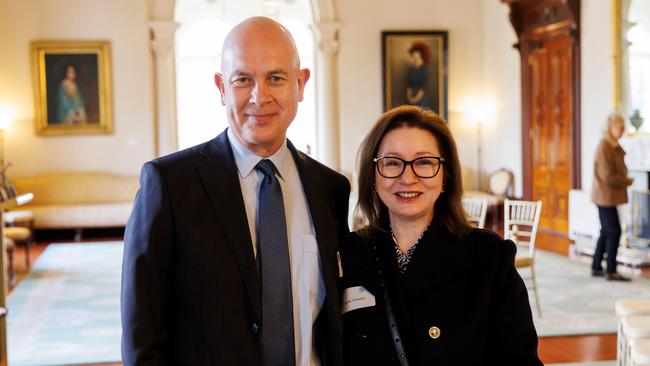
“For me and for us, this is about really helping women have this conversation earlier so that they can put themselves in the best position to future proof their fertility, to look at their plans and make good decisions.”
WHEN recently raised $1.2m in a funding round led by Sydney tech firm Paloma Ventures, which also delivered the first mobile app for Australian buy now, pay later juggernaut Afterpay.
In addition to funding the business, WHEN’s digital platform was built by Paloma.
Paloma co-founder and co-CEO Nick Frandsen says: “Having worked with Maz and Brett, and alongside their board of medical experts right from the beginning, we have developed a deep knowledge of WHEN and how it will help people better understand their reproductive health.”
Stephen Tomisich hopes Trajan, given its international footprint, can support WHEN to look at global opportunities for its product.
“It may be that at a certain point, when they want to globalise their business, we are able to work with them and support that expansion,” he says.
“It could also be that they want to go deeper in terms of the information provided, which might require variations of the sampling tools in some shape or form. We could go that way as well.”
The now or never moment
The Tomisiches’ company, named after the Roman emperor, Trajan, employs more than 680 people and has seven manufacturing sites across the US, Australia, Europe, and Malaysia.
Trajan’s products and solutions are marketed under multiple brands, given that the firm has acquired 12 businesses since it was founded in 2011.
Trajan’s customers include some of the largest pharmaceutical companies such as Pfizer, Moderna, Regeneron, Genentech and GlaxoSmithKline as well as medical instrument manufacturers such as Thermo Fisher Scientific, Japan’s Shimadzu Corporation, the Danaher group and Agilent Technologies.
The Tomisiches, who worked in corporate jobs in medical and scientific technology before launching Trajan, met former Australian Wallabies rugby captain John Eales through the Westpac Business of the Future awards in 2017.
They were assigned Eales as their mentor.
Eales was so enamoured with the Trajan story that he stayed involved with the company over the coming years at no charge. He provided advice on leadership and was also willing to share his sporting, life and business experiences.
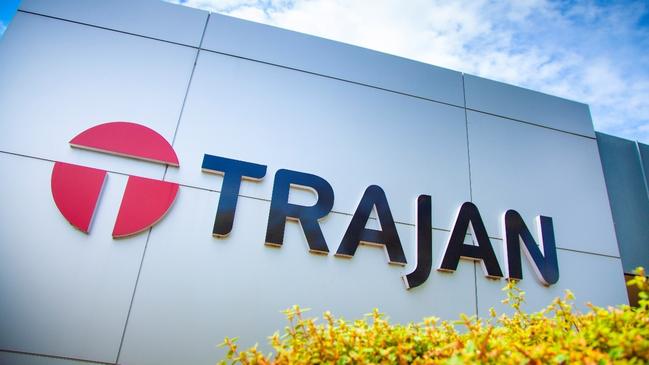
“So when we decided to go public, because of the relationship we had developed, it was an obvious choice to ask him if he would be chairman. But it was never about having him as the public face of the company,” Stephen Tomisich says.
“I can tell you in the boardroom he facilitates, he ensures it is non-political and that everybody has a say. In a true sort of captain’s way, he keeps the spirits high and makes sure that we are cohesive as a team.”
The Tomisiches’ only daughter, Danielle – a physicist by training – joined the business at its launch in 2011. Her father describes it as a “now or never” moment to turn their dreams into a reality.
“When the three of us sat down at the kitchen table in 2011 we asked ourselves a couple of questions. How serious are we and what are we willing to risk? Our collective answer was we were willing to risk everything,” Stephen says.
“After that meeting, I went literally went across the road and asked our neighbours, ‘If we were to lose everything, could we move in with you’?”
The family mortgaged their home to buy a company with a $3m turnover and a staff of seven that supplied equipment for pathology operations, and they started building the business that is now called Trajan.
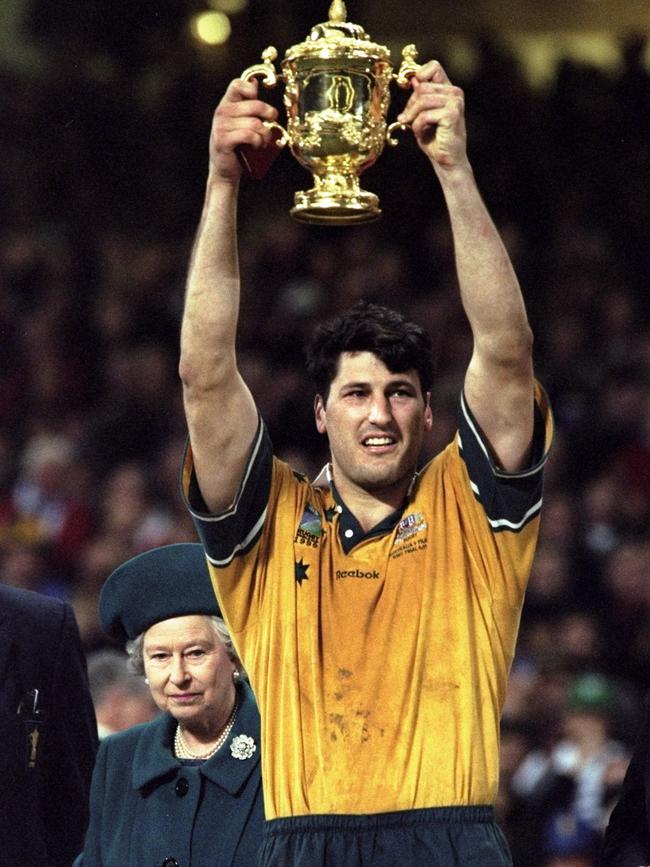
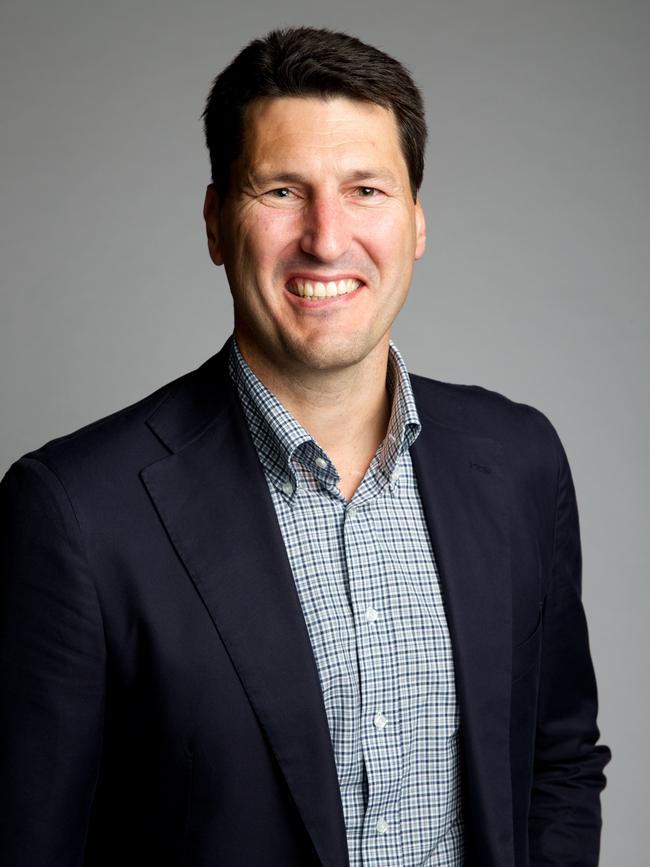
At the firm’s initial public offering in May 2021, the Tomisiches sold down 23 per cent of their stake and retained a 60 per cent shareholding.
Since then the share price has struggled, falling more than 30 per cent from its issue price.
But that doesn’t worry Stephen one bit.
“I’m one of those CEOs that doesn’t complain about the share price. I don’t get bogged down in that stuff,” he says.
“We’ve never been thinking about where it is every day, because coming back to the beginning, we are driven by the difference Trajan will make in the world. I think that we will find over time that the investment journey will reflect the same sort of outcome.”
What comes next
The selldown at the float netted the Tomisich family $40m.
Asked how the wealth they crystalised has changed them, Stephen says: “There was an awakening for us that with that wealth comes responsibility.
“Reaching that point, we could treat it one of two ways; as a destination where we get off, or a new platform upon which to relaunch. We chose the latter.”
The Tomisich Foundation that they established now pursues several philanthropic endeavours.
The first is heritage, underpinning the couple’s decision to pay $40.5m – all their proceeds from the float – in July 2021 to buy a mid 19th century Hawthorn property from former Australia Post boss Ahmed Fahour.

At the time it was the second highest price ever paid for a residential property in Melbourne.
“Angela became incredibly interested in heritage,” her husband says, noting she is now a director on the National Trust of Victoria which looks after historic buildings.
The Tomisiches now conduct a variety of not-for-profit events at the Hawthorn property.
“People come to us with their cause and say, ‘Okay, we’d like to use this as a platform to raise some money here or there’, and we will listen to that. We will provide the property, plus extra if needed to raise some money for their causes,” Angela Tomisich says.
The second area funded by the Tomisich Foundation is education.
Stephen has joined the board of the Victorian Endowment For Science Knowledge & Innovation (Veski), which was established by the Victorian government in 2004 to enhance Victoria’s intellectual capital through a program of fellowships, awards, and international networks.
“Mainly our interest is around STEM (science, technology, engineering and mathematics) and pursuing the development of women and girls in STEM,” he says.
The Tomisich Foundation is a passionate supporter of a Melbourne-based charity known as Safe Steps – a statewide 24/7 crisis response centre that each year receives about 150,000 phone calls and provides more than 35,000 bed nights of crisis accommodation for people escaping family and domestic violence.
About 40 per cent of their resources are devoted to helping children.
“We are not passive investors across any of the three areas we support. In that domestic violence area, after three months on board we went and met with the first person we funded. We wanted to understand what differences have made to the kids; to ask what we had learned," Stephen says.
“If we were to scale this model, what does it look like? Because we think that we can have the most impact where we become fully involved and engaged, not at arm’s length just signing a cheque.”
When asked why domestic violence is such a passion, he replies: “Let me put it this way. There’s three themes to the Tomisich Foundation. Mine was around education, Angela’s was around the importance of heritage and education tied into heritage and our daughter’s one was about domestic abuse.”
Why, I ask. There is a pause before he replies. “Well, we probably don’t want to go there.”
After another pause he continues: “It is a space where you need to learn before you act.
“It could be easy to step in somewhere and think that it is a simplistic approach and answer, but it is a complex area.
“So that was really the benefit for us, to sit down with a team like Safe Steps and understand their sanctuary model and where we could add something that wasn’t being addressed already by the mainstream supporters.”
While the Tomisiches want to change the world for would-be parents like Maz Coote and Brett Barnes with the work of Trajan, for their daughter the work of their philanthropic foundation is clearly personal.
“I think this niche area of the foundation is really helpful for her, and she feels very rewarded to be able to assist,” Angela says.
“It is the same for all of us, to be able to work in the not for profit area like this to make a difference.”




To join the conversation, please log in. Don't have an account? Register
Join the conversation, you are commenting as Logout